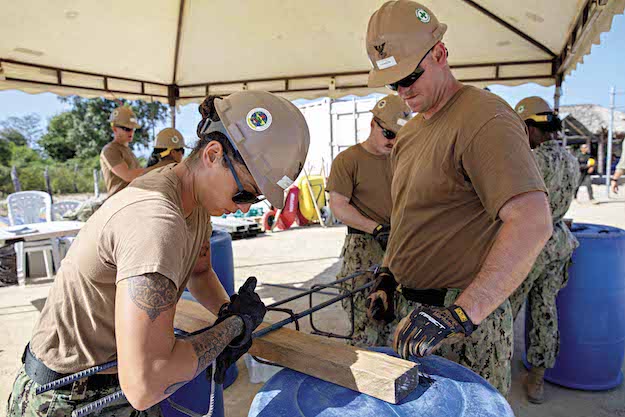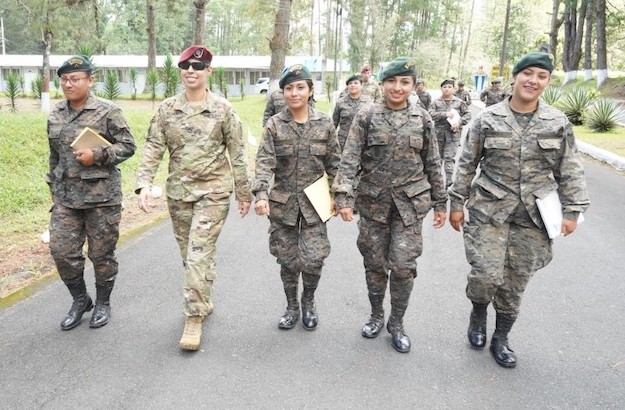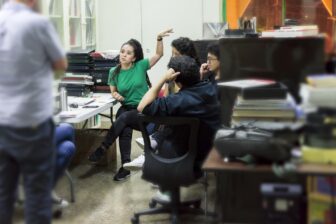This article is adapted from AQ’s special report on closing the gender gap | Leer en español
It’s a message we share and have heard loud and clear from our partners around the hemisphere: If you want to be a successful minister of defense or chief of security, you have to recruit the best talent, while also addressing both structural and cultural challenges to advance that talent. This means taking advantage of all segments of society–especially women. It is absolutely necessary to fully integrate women into defense and security forces to be successful in the 21st century–to be professional, ready for any mission, and legitimate in the eyes of the population.
The U.S. Southern Command (USSOUTHCOM), which is responsible for security cooperation and engagements in Central America, South America and the Caribbean, is committed to advancing the Women, Peace and Security (WPS) strategy. WPS provides an essential engagement opportunity to strengthen relationships with our partners. Our efforts include supporting women’s empowerment and ascension within the defense and security forces, meaningful participation at the decision-making table, protection from violence, and access to humanitarian assistance resources. Achieving gender equality in Latin America and the Caribbean is one of the keys to overcoming structural and cultural challenges in the region. Our goal is clear: a more secure, prosperous and free hemisphere, which is only possible when women have an integral role in building this future.
Twenty years ago this October, the United Nations Security Council (UNSC) adopted Resolution 1325 (UNSCR 1325), which addresses how the world deals with conflict, gender roles and stability efforts. The resolution’s logic is: Men, women, girls and boys are affected differently by conflict. This resolution, and a follow-on series of UN resolutions, have established that women should participate at all decision-making levels of international peace, security and defense to more effectively promote stability and recovery after conflict. The WPS initiative brings the UNSC resolution’s logic to the forefront, and expands the themes that are already deeply rooted in national and international policy dialogue. For Latin America and the Caribbean, the WPS agenda has guided a generation of trailblazers, researchers and peacekeepers to work tirelessly toward a safer and more secure hemisphere.
What We Know
WPS has taught us much about community health, stability operations, and the threats we face. We know that gender equality, along with whole of government solutions to economic governance and security challenges, makes countries and communities more stable and peaceful. We also know that places with significant gender gaps or fewer rights for women have a higher incidence of corruption and violence. Research shows that peace negotiations are 35% more likely to succeed when women are part of the process. Hard-won experience tells us that women are key to preventing conflict before it breaks out, and that their participation enables communities to curb escalating violence and defuse tensions between groups. Moreover, women peacekeepers foster greater trust within communities. Including gender perspectives during the planning and execution of these peacekeeping operations improves access to local populations and increases local support.
Many of the threats we encounter in the region exploit the value of women. For the last several decades, Colombian guerrilla groups have specifically targeted and recruited vulnerable women using tactics of coercion, manipulation, promises of better physical and economic living conditions, and leveraging familial ties. Before laying down its arms in 2017, the longest-standing group, the Revolutionary Armed Forces of Colombia (FARC), presented itself as a feminist and egalitarian organization, but actually fostered an environment where women confronted the same challenges, harassment and inequality that they might face in broader society. In addition to the threats women face from guerrilla groups, many of the trafficking networks across the region that move illicit drugs share a common physical and financial infrastructure with human trafficking networks — another threat against women and security.
To enhance capabilities and counter threats, USSOUTHCOM is implementing strategies to empower women and promote their equality across the hemisphere as integral to the broader goal of achieving professional defense and security forces that have strong value-based institutions. A gender perspective is opening up a new world of opportunities to strengthen partnerships, provide innovative ways to solve old problems, and enhance our team for today’s complex environments and battlefields. The command’s WPS program employs subject matter experts who advise our key leaders and staff on the integration of gender perspectives in military domains across the continuum of defense and security sectors in our region. These gender advisers ensure we accurately represent the roles of women in our plans, operations and exercises, as well as encouraging our partners to implement changes that enhance the meaningful participation of women in decision-making processes.
Where We Have Been
Across the Western Hemisphere, militaries and security forces are reaching the same conclusion: WPS matters to national and regional security. This is not a new phenomenon; in 1999, Mireya Pérez of Chile became the first female general in Latin America. About the time UNSCR 1325 was going into effect, the Salvadoran armed forces opened its doors to female candidates; since then, more than 1,500 women have joined. Even before WPS, women in Jamaica and Guyana were breaking barriers. Aviation has been a particularly bright spot for the integration of women in Latin America and the Caribbean security spaces. Today, women from Brazil, Colombia and El Salvador, to name a few, fly combat aircraft. This year, the Brazilian Navy will celebrate the 40th anniversary of the integration of women; next year, Brazilian women will continue to break new ground and be able to serve in combat roles in the Marine Corps (CFN in Portuguese) for the first time. Women are increasingly assuming prominent roles and conquering previously unthinkable spaces.
Since 2000, six of our partner nations have adopted WPS National Action Plans: Chile (2009), Argentina (2015), Paraguay (2015), Brazil (2017), El Salvador (2017) and Guatemala (2017). Many more have learned that women help prevent violence and provide security by fostering inclusive approaches such as trust-building, initiating dialogue and bridging divides. Making up over 50% of the population, women bring unique and necessary skills to security forces. In addition to serving in operations at home, Latin American female soldiers have supported peacekeeping missions across Africa, including operations on the border of the Central African Republic and Sudan.
For the USSOUTHCOM team, working alongside the courageous women service members throughout our region is a moving experience. These women share stories of struggle, commitment, challenge and triumph while serving their country and improving security for their children, their families and their communities.
Two particularly powerful instances highlight advancement in WPS. During a visit to a Colombian military base, the U.S. and Colombian senior leadership met with a group of 50 Colombian female soldiers. These women had the opportunity to share their successes and challenges with their top officers for the first time. The energy in the room was electrifying as women lined up to tell their stories, and as the meeting was coming to an end, Colombian leadership wanted to continue. This engagement offers a valuable lesson to all military leaders: recognize talent from the full human spectrum of your teams.

A second example of advancement in WPS occurred when USSOUTHCOM hosted a recent Caribbean Security Conference. In an audience of primarily male leaders, USSOUTHCOM held a WPS session with women leaders discussing their experiences. The dialogue on gender integration quickly turned into our regional partners proudly sharing and highlighting their WPS efforts. The Jamaican chief of defense staff, Lieutenant General Rocky Meade, was the first to stand and share how he implemented structural changes in recruitment and promotion and the benefits that he had personally witnessed as a result. Other chiefs of defense (CHODs) were quick to jump in and give their examples. One CHOD proudly cited that the top five graduates in a recent recruitment class were women. Another CHOD commented that the average dropout rate for basic training in his country is about 15%, but zero percent for women. He emphasized, “Women who start are committed; they do not give up and will fight to the end.” Women understand what is at stake and that their successes or failures affect the prospects of other women assuming these roles.
At USSOUTHCOM, we know that military units are better and stronger when they are integrated. We know that when we invest in a woman, she changes not only her own life, but also lives within her family, community, unit, institution and country. While structural changes to recruitment, training and promotion systems are critical, professionalization also entails empowering and elevating talented women across the defense and security sectors. This is our job as senior leaders.
Where We Are Going
Moving into the new decade, USSOUTHCOM will charge forward to advance the 2019 United States Strategy on Women, Peace and Security and U.S. Secretary of Defense 2020 Strategic Framework and Implementation Plan. We will lead the way, improve our readiness and professionalism, and compete against myriad threats facing our shared hemisphere. We still have much progress to make in the United States, which is why highlighting women breaking barriers is so critical. Being the first is never easy, but it does pave the way. When we have the second, third, tenth woman in a key position, when it stops being remarkable, and when it is finally viewed as enhancing the combat effectiveness of our forces, then we will have achieved true gender equality.
As we evolve, USSOUTHCOM will continue to strongly encourage partners to implement policies, plans and structural changes that enhance women’s meaningful participation in decision-making processes related to peace and security. In the military, we talk about domains—land, sea, air, space and cyber—but the most valuable one is the human domain. The people in our partners’ militaries—women and men—are working hard to build a more secure, prosperous and free hemisphere. Our inclusivity and diversity throughout the ranks enhances decision-making, accelerates our multinational integration, and delivers forces capable of winning against any adversary.
There is a global competition afoot between the forces of democracy and those that favor kleptocracy and authoritarianism. In this struggle, WPS has become a venue to learn from our partners and also to find shared values and continue to build trust. As the most powerful military in the world with a long history of integration, the United States has an essential role to play in assisting partner nations to create greater equality in their workforce, while resisting the tide of authoritarianism.
The Western Hemisphere is our shared home. In the United States, we share culture, values, economic ties, close proximity and an appreciation for democracy with most neighboring nations. Our futures are linked, and our shared desire for peace and security warrants a shared responsibility for action.
Professional defense and security forces play a vital role in sustainable security in our shared neighborhood. When trying to achieve sustainable security, it is imperative that a nation’s defense and security forces be legitimate and respected. Defense and security professionals who are both respected by their population and ready for all contingencies embrace the rule of law and respect for human rights, as well as a commitment to the ethical use of force, full integration of women in our forces, and the vital role of noncommissioned officers. Truly professional defense and security forces are ready across the entire spectrum of potential missions, from exercises to combat to peacekeeping. At USSOUTHCOM, we work with militaries across Latin America and the Caribbean to build professional forces that partner with the United States to improve security in the Western Hemisphere. USSOUTHCOM will continue to pursue operations, activities and investments that improve the readiness and professionalism of our U.S. military and the security forces of our partner nations. We have found that professional forces demonstrating inclusion and support for women are a key attribute of democracy and are vital to winning today’s competition. This month, we celebrate 20 years of progress and lead the way into the next chapter of WPS in our region. We do not do it alone. We do it with many of our partners as they share our conviction that women enable a more secure, prosperous and free hemisphere. ¡Trabajamos Juntos y Avanzamos Juntos!
—
Ambassador Manes is the civilian deputy to the commander and foreign policy adviser at the U.S. Southern Command. Admiral Faller is the commander of the U.S. Southern Command.







